Smallholder farmers are often located in remote rural areas. Companies report to service remote areas through a multitude of means. The most common avenue is to work through agrodealers. These agrodealers, agro-vets or agricultural supply stores, are usually situated in rural villages across countries. A greater number of agrodealers in a countries enhances and lowers the travel distance for farmers. As agrodealers are many smallholder farmers’ only point of engagement, their level of agricultural knowledge and diversity of their portfolio is key. This is also why some companies, such as East-West Seed, train agrodealers to enhance their technical skills, enabling them to provide agronomic advice to smallholder farmers.
It’s largely regional companies that demonstrate best practices for reaching remote areas in index countries. Bangladeshi company BRAC works with 650 agrodealers and 7,000 retailers across the country. It reaches remote areas through a door-to-door sales scheme, with the aim of also reaching women smallholder farmers. Nigeria-based Maslaha Seeds relies on 200 seed shops and 600 registered local seed dealers. Also in Nigeria, Premier Seed has 1,000 registered distributors, demonstrating that it follows a fine mesh approach. In Eastern and Southern Africa, multiple other approaches are used to reach smallholder farmers. Ethiopian Agricultural Business Corporation works in collaboration with farmer unions and cooperatives to distribute seed up to remote local (‘kebele’) level. Seed Co trains ‘ambassadors’ or lead farmers who in turn are in charge of promoting and selling seed, an approach also used by multiple other companies. Capstone Seeds, East African Seed and Equator Seeds leverage NGO networks to deliver seed to smallholders who would be hard to reach through typical distribution channels. Other examples include using company vans, tuktuk’s or bike officers, courier services and local buses or motorbikes to deliver seed to the remotest areas.




